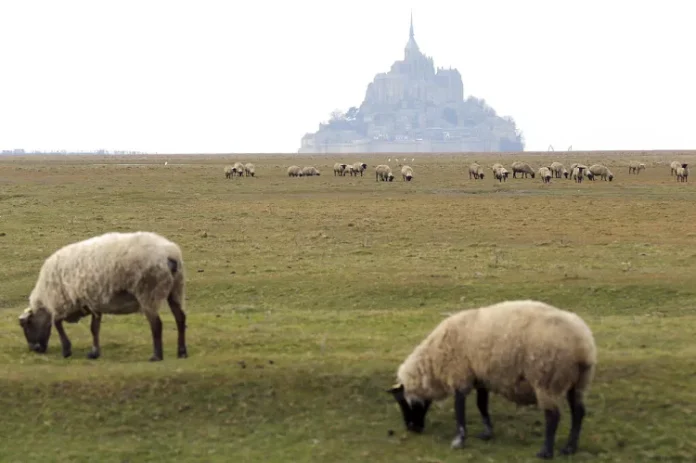
A new and potentially fatal strain of bluetongue disease has emerged across Europe, first exploding on Dutch farms before making its way to France, where it has triggered a significant epidemic in the Isère department.
The outbreak has raised serious concerns among agricultural officials and farmers alike as the virus continues to spread, affecting livestock across the continent.
New Strain Identified in France
The bluetongue virus, transmitted by small midges, causes severe symptoms including mouth ulcers, difficulty breathing, and high fever in sheep and cattle.
In severe cases, it can be fatal. The newly identified strain, known as the BTV3 serotype, has been causing widespread damage in the French region of Isère, with 31 confirmed cases and a suspected additional 100 cases according to local authorities.
In Poliénas, a town heavily impacted by the outbreak, sheep farmer Cédric Ruzzin has reported the death of 55 of his 150 sheep. “These animals are affected.
They’ve lost weight, they’re drooling and swelling. I have animals with fevers of over 40 degrees Celsius,” Ruzzin said. The situation has been dire for many farmers, who are struggling to manage the impact of the disease on their herds.
Delayed Response and Containment Efforts
The French government’s response has been swift but has come under criticism for being delayed. Aurore Tosti, Director of the Isère Health Defence Group, pointed out that the late recognition of the new strain allowed it to spread before effective containment measures could be implemented.
“You can’t treat the disease itself. We can only try to alleviate the symptoms and get the animals over the hump,” Tosti said.
In an effort to control the outbreak, the French government has distributed 6.4 million doses of vaccine to the affected areas.
Of these, 1.1 million doses are designated for sheep, while 5.3 million are reserved for cattle. Additionally, regulated zones have been established around the infected areas to prevent further spread.
Despite these efforts, Tosti expressed frustration over the timing of the vaccination campaign.
“Vaccination is the solution, but we’re too late. Unfortunately, once the disease is in the herd, we’re pretty helpless because all we can do is treat the symptoms,” she told Euronews.
Wider European Impact
The new strain of bluetongue disease was first detected in Dutch farms and has since spread to several other European countries, including Germany, Denmark, Belgium, and Luxembourg.
In Belgium, the outbreak has significantly impacted over 500 farms since the virus was first recognized in October 2023. The scale of the problem has prompted Federal Minister for Agriculture David Clarinval to call for the sector to be officially recognized as being in “crisis.”
The spread of the disease across multiple countries highlights the potential for a larger, more widespread outbreak.
The virus’s ability to travel across borders and affect livestock in various regions underscores the need for a coordinated response among European nations to manage and mitigate the impact of the disease.
Agricultural and Economic Concerns
The bluetongue epidemic presents serious concerns not only for animal health but also for the agricultural economy. Farmers are facing substantial losses due to the deaths of their livestock and the cost of managing the disease.
The economic impact of the outbreak is expected to be significant, with potential repercussions for meat and dairy production across the affected regions.
The situation has also raised questions about the effectiveness of current vaccination strategies and the need for improved surveillance and early detection systems to prevent similar outbreaks in the future.
As the virus continues to spread, there is a pressing need for ongoing research and development to address the challenges posed by this new strain of bluetongue disease.
Looking Forward
As Europe grapples with the impact of the new bluetongue strain, the focus remains on containing the outbreak and mitigating its effects on livestock and farmers.
The French government’s efforts to distribute vaccines and establish regulated zones are crucial steps in managing the crisis, but the timing of these measures has highlighted the need for more proactive approaches to disease prevention and control.
The situation in France and across Europe serves as a reminder of the challenges posed by emerging animal diseases and the importance of international cooperation in addressing such threats.
As the epidemic unfolds, stakeholders in the agricultural sector, public health officials, and policymakers must work together to navigate the crisis and support affected communities.
The coming weeks will be critical in determining the effectiveness of containment efforts and the overall impact of the outbreak on Europe’s livestock industry.
Continued vigilance and a coordinated response will be essential in managing the current crisis and preventing future outbreaks of bluetongue disease.